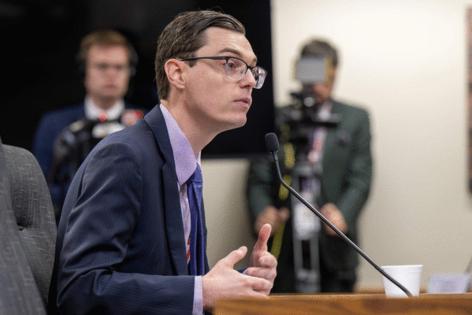Can voters stop Missouri gerrymander? A group is trying to force a statewide vote
Published in News & Features
JEFFERSON CITY, Mo. — Just days after Missouri Republicans passed a gerrymandered congressional map that carves up Kansas City, a new campaign is charging forward with a plan asking voters to repeal it.
The campaign, called People Not Politicians, began collecting signatures on Monday to force a statewide referendum vote. The group plans to continue gathering signatures in Kansas City and across Missouri to put the new map on the November 2026 ballot.
“Missourians should pick our elected officials,” Richard Von Glahn, the group’s executive director, said during a virtual briefing on Monday. “Elected officials shouldn’t pick who they wish to represent in Missouri.”
The effort marks the latest in a barrage of attempts to strike down the map, which Missouri lawmakers approved last week under pressure from the Trump administration. A flurry of lawsuits filed last week also seek to block the map from taking effect.
Referendum campaigns are outlined in the Missouri Constitution, which allows voters to challenge most bills passed by state lawmakers. Campaigners have until Dec. 11 to collect enough signatures to force a statewide vote on the map.
Elsa Rainey, the campaign’s spokesperson, said in a phone call that individuals interested in collecting signatures can sign up on the campaign’s website. The group is also holding a training session on Saturday.
Supporters of the referendum push appear confident that they will be able to force a vote on the new map, which has faced intense pushback across the state. Thousands of people descended on the Missouri Capitol last week to protest the gerrymandering attempt.
Republican Gov. Mike Kehoe, who called lawmakers into an unprecedented special session to redraw the map, had not yet signed the legislation into law as of Tuesday.
How does the process work?
Shortly after the Missouri Senate approved the map on Friday, representatives from People Not Politicians attempted to file a citizen referendum with the Missouri Secretary of State’s Office.
In a pair of letters over the weekend, Republican Secretary of State Denny Hoskins initially rejected the filing before backtracking on Sunday. As statewide officials review the filing, the campaign has plunged forward with signature collecting.
Rainey said the Missouri Constitution makes clear that campaigners can begin collecting signatures once a referendum petition is filed. She said she hopes the campaign won’t receive any additional pushback from statewide officials.
To trigger a referendum, campaigners have 90 days to collect enough signatures in at least six of Missouri’s eight congressional districts. The signature threshold would have to be equal to 5% of voters in each respective district based on the most recent gubernatorial election.
Based on that election, the minimum number of signatures necessary to get a veto referendum on the ballot would be 106,384, according to the Missouri Secretary of State’s office.
The campaign faces a tight deadline, but veto referendums have been successful in Missouri as recently as 2017, when labor unions successfully organized to defeat a right-to-work law that would have banned compulsory union fees.
The new group also received a financial boost over the weekend.
The political action committee supporting the referendum on Saturday received $500,000 from Global Impact Social Welfare Fund, a progressive nonprofit based in Washington, D.C., that is not required to disclose its donors.
The same day, the PAC also reported a $50,000 donation from United Food and Commercial Workers.
Inside Missouri’s map
The votes on Friday marked a significant moment in Missouri, potentially altering the political makeup of Kansas City for years. Kehoe called lawmakers into a special session to gerrymander the map and overhaul the state’s key process for direct democracy.
The map lawmakers approved would slice Kansas City voters into three Republican-leaning congressional districts. The goal is to push out Democratic U.S. Rep. Emanuel Cleaver and allow a Republican to win his 5th Congressional District.
The effort came as the Trump administration has pressured Republican-led states to gerrymander their U.S. House maps ahead of the 2026 election. President Donald Trump wants to ensure Republicans maintain their slim majority in Congress.
Missouri’s map marks an overt example of partisan gerrymandering, a term used to describe the practice of redrawing electoral district boundaries to favor one party over another.
Republicans currently control six of Missouri’s congressional districts while Democrats hold the 5th District in Kansas City and the 1st District in St. Louis, under maps lawmakers passed in 2022.
Congressional districts are typically only redrawn once every decade based on data from the U.S. Census Bureau.
_____
©2025 The Kansas City Star. Visit at kansascity.com. Distributed by Tribune Content Agency, LLC.







Comments